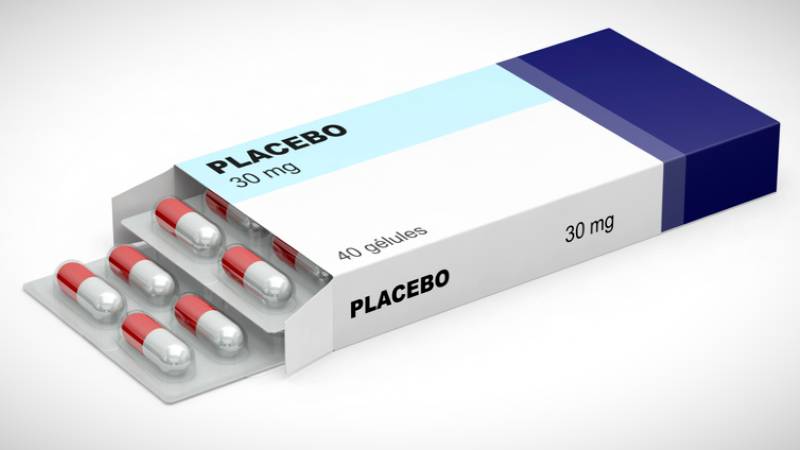The placebo effect is widely known amongst medical professionals and patients and has been shown to be powerful. Though unable to cure disease, studies have shown placebo drugs can be symptomatically effective for up to 75% of patients with a reduction of up to 50% of physical symptoms depending on the particular ailment [1–3]. There have even been studies shown that placebo surgeries can offer near identical reduction in knee pain due to osteoarthritis as compared to traditional arthroscopy [4].
Whether physicians actually prescribe their patients placebos varies depending on how the physician’s personal definition of placebo. In a survey of internists and rheumatologists practicing throughout the United States, 58% of physicians reported prescribing placebo treatments when they were defined as potentially beneficial medicine or treatment not typically used for their condition, while only 18.5% of physicians reported describing them as placebos outright [5]. When expanding the physician specialty to all primary care providers, the numbers jump even higher. In a systematic review and meta-analysis on how frequently general practitioners prescribe placebos, researchers found that 97% of the 2,981 GPs surveyed reported prescribing pure placebos or other non-specific therapies at least once in their career [6].
With such a large proportion of physicians utilizing the placebo effect, the question arises of whether they should. The consequentialist perspective asserts that so long as the outcome is positive, prescribing placebos or other unsupported therapies is fine—this also in accord with the principle of beneficence and the physician-adopted motto of “do no harm.” Additionally, if the placebo is low cost, in limited-resource environments it allows the physician to allocate scarce resources to ailments that cannot be improved through placebos.
On the other hand, the deontologist perspective asserts that lying or deceiving the patient is morally wrong and is an action that can and should be avoided—this in line with the fiduciary relationship established between doctor and patient where the fiduciary owes trust and candor. Lying, in any form, could begin to erode trust that forms the basis of the physician-patient relationship while also presenting a “slippery slope” to the physician. If they are willing to lie to the patient regarding their treatment, even though they perceive it to be beneficial, what else are they willing to lie to them about?
As with many other ethical dilemmas, the physician is forced to grapple between two difficult situations: deceive the patient to provide a potentially advantageous treatment or forego this benefit to remain truthful.
Perhaps a solution to this moral dilemma lies somewhere in the middle. Ted Kaptchuk of the Harvard Program in Placebo Studies believes that while deception is unethical, placebos can still be very powerful even when not concealed. In a study on migraine pain he found no difference in perceived pain when subjects were given placebo labeled as “placebo” versus placebo labeled as “drug,” with both groups seeing a 50% reduction in symptoms [3]. In an interview with The Atlantic, while acknowledging the role of placebo as complicated, he postulated that subjective symptoms like pain can be partially alleviated by the ritual act of taking medicine [7]. Similarly, in a study focusing on patients’ views of placebos, the majority of subjects reported that while they would not like to be directly lied to, they would be open to taking medicine that is potentially beneficial, but not necessarily specific to their condition [8]. Ultimately, the physician may be able to navigate this dilemma to provide quality care without eroding trust by establishing an honest relationship with patients.
[1] Leuchter AF, Cook IA, Witte EA, Morgan M, Abrams M. Changes in Brain Function of Depressed Subjects During Treatment With Placebo. American Journal of Psychiatry. 2002;159(1):122-129. doi:10.1176/appi.ajp.159.1.122
[2] Wechsler ME, Kelley JM, Boyd IO, et al. Active Albuterol or Placebo, Sham Acupuncture, or No Intervention in Asthma. New England Journal of Medicine. 2011;365(2):119-126. doi:10.1056/nejmoa1103319
[3] Kam-Hansen S, Jakubowski M, Kelley JM, et al. Altered Placebo and Drug Labeling Changes the Outcome of Episodic Migraine Attacks. Science Translational Medicine. 2014;6(218). doi:10.1126/scitranslmed.3006175
[4] Mosley B, O’Malley K, Petersen N, Menke T. A Controlled Trial of Arthroscopic Surgery for Osteoarthritis of the Knee. New England Journal of Medicine. 2002;347:81-88. doi:10.1056/NEJMoa013259
[5] Tilburt JC, Emanuel EJ, Kaptchuk TJ, Curlin FA, Miller FG. Prescribing “placebo treatments”: results of national survey of US internists and rheumatologists. Bmj. 2008;337(nov06 3). doi:10.1136/bmj.a2435
[6] Linde K, Atmann O, Meissner K, et al. How often do general practitioners use placebos and non-specific interventions? Systematic review and meta-analysis of surveys. Plos One. 2018;13(8). doi:10.1371/journal.pone.0202211
[7] Schattner E. The Placebo Debate: Is It Unethical to Prescribe Them to Patients? The Atlantic. https://www.theatlantic.com/health/archive/2011/12/the-placebo-debate-is-it-unethical-to-prescribe-them-to-patients/250161/. Published December 19, 2011. Accessed January 7, 2020.
[8] Bishop FL, Aizlewood L, Adams AEM. When and Why Placebo-Prescribing Is Acceptable and Unacceptable: A Focus Group Study of Patients Views. PLoS ONE. 2014;9(7). doi:10.1371/journal.pone.0101822.
Arjun Johal is a member of The University of Arizona College of Medicine – Phoenix Class of 2023. He graduated from the University of California at Santa Barbara in 2016 with a major in Biochemistry and a minor in English. In his free time he enjoys anything that gets him moving, whether it be a bicycle, a surfboard, or anything in between. He also welcomes discussion on topics of all ranges, ideally over a cup of tea. Feel free to contact him at arjunjohal[at]email.arizona.edu

